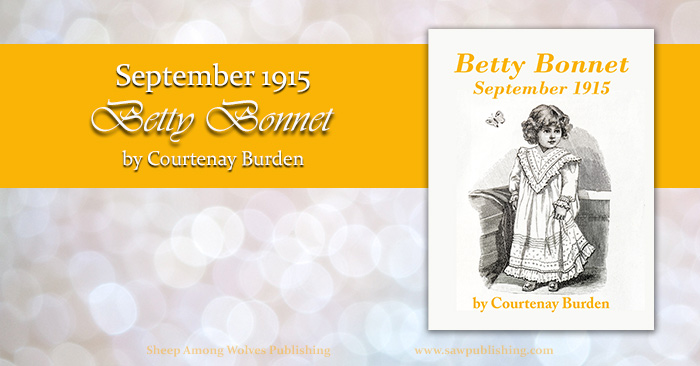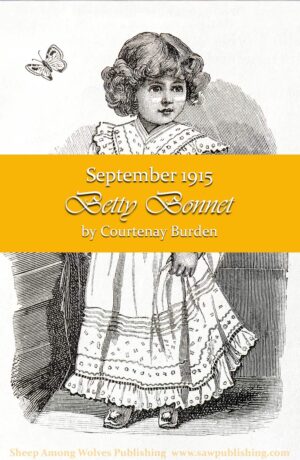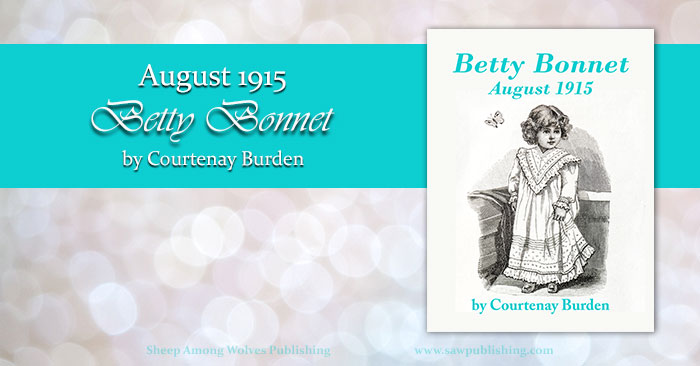Betty Bonnet September 1915
 Betty Bonnet is an ongoing serial story, released on the Sheep Among Wolves blog once a month. It follows the adventures of the Bonnet family, first created by Sheila Young as a paper doll series released in the Ladies’ Home Journal beginning 1915. To go to the first episode, click here.
Betty Bonnet is an ongoing serial story, released on the Sheep Among Wolves blog once a month. It follows the adventures of the Bonnet family, first created by Sheila Young as a paper doll series released in the Ladies’ Home Journal beginning 1915. To go to the first episode, click here.
I.
In September, Betty ought to have started back to school. She had a new pink serge frock, and a new pink silk hat, and a new eclectic reader—and the first week of September ought to have found her tramping cheerfully along with Billy and I, bound for the big stone steps and neatly polished desks which are the gateway (at least in Betty’s case) to Learning.
In point of fact, something else happened instead.
On the very morning when the pink serge and the pink silk and the eclectic reader were wriggling about in the hall, rejoicing in their newness, and in Betty’s delight in exhibiting them, Mrs. Bonnet receive a telephone message to the effect that the headmistress had got measles, and Betty’s school was closed indefinitely until she un-got them.
 II.
II.
“Jolly lucky for you!” said Bob, as he strapped up his books, and checked that his new baseball bat was quite as new and batty as it had been the night before.
Betty did not think it was jolly lucky, however.
Betty, personally, was quite shocked.
“I didn’t think growned people ever did have measles,” she confided to me in a whisper after breakfast.
“The do—sometimes,” I explained vaguely. “Only not—when they can help it.”
Betty looked serious.
It is all very well to say that an ant has been accidentally run over with the garden roller. But if somebody took it upon themselves to announce calmly at breakfast one morning, “Oh, by the way, darling, Jones has been and run over an elephant this morning. Just an accident, you know. These things happen—sometimes.” Well, under that sort of unauthorized catastrophe, anybody would be justified in looking grave.
III.
It was very disappointing, too, to watch Bob and Billy (and myself, in the still-enduring person of escort,) depart without her.
It was very disappointing to have no one to admire the pink serge and the pink silk.
Most of all, it was very disappointing to think that it was to be weeks and weeks—at the very least, an entire fortnight—before anybody was to use that glorious new reader.
In fact, I do not know how Betty would have survived the day that followed, if it had not been that quite unexpectedly, Barbara came for a visit.
Barbara is Betty’s very eldest sister. She is so much eldest, that Betty has only a dim and shadowy recollection of the day when Barbara (in a very white, lacy dress) coaxed Betty (in an equally white, but this time flower-trimmed, dress) down a long church isle with a bouquet in her arms, so that Barbara could become Mrs. Frank Everett of Chicago—and go to live, with Mr. Frank Everett, in Chicago, incidentally.
IV.
Barbara (together with Mr. Frank Everett, and the little Everetts) come to visit in New York pretty often. The exciting thing about this visit was that it was a surprise. Quite as much of a surprise as the headmistress’s measles. On might almost have said, quite as accidental. Mr. Frank Everett was sent by his company, with about twenty-four hours notice, on a business trip to the east coast. And Mrs. Frank Everett came, with about twelve hours notice, to stay with her relations until his business was over.
She brought her two little girls with her— the Little Niece who was just learning the alphabet, and the Baby Niece who was just learning to crawl.
Their presence gave Betty a sudden and brilliant idea.
“I will teach them both to read,” said Betty.
V.
Betty was a very systematic teacher.
She set the Little Niece and the Baby Niece both in the window seat—each on their own cushion. Then she fetched a footstool, a ruler, and the eclectic reader.
Sitting on the footstool, Betty’s head came up about on a level with the Little Niece’s knees, but Betty seemed to find the arrangement satisfactory. She opened her book, looking doubtfully through the first few pages, which aren’t really meant for anybody to read. They are full of words like “diphthong” and “articulation” and sentences about how “the long continued popularity is sufficient evidence of the positive merits” and “frequent exhibitions of the correct method will be found more effectual.”
The Baby Niece squirmed, and showed symptoms of falling off the cushion.
Betty set her back upright, made an impulsive decision, and paged ahead to the entry titled “Lesson One.”
“We’ll start here,” explained Betty importantly.
VI.
She pointed the ruler at the first line of text.
“Does anybody know what that letter is?” she asked, looking expectantly at the Little Niece.
“‘F’” said the Little Niece promptly.
Betty was surprised. She turned the book around, and scrutinized it carefully.
“It is an ‘L,’” she informed the Little Niece, with just a touch of reproach in her voice.
“Oh,” said the Little Niece, with interest.
“‘L,’” corrected Betty, with the patience of a Job, and the assurance of a Caeser.
The Little Niece, perhaps feeling it wiser, made no remark.
“It is an ‘L,’” explained Betty, warming to her topic. “That’s because the first word is ‘Little.’ I will read it for you, and then you’ll see how it’s done.”
And Betty proceeded to read, with occasional pauses, and close scrutiny of the longer words:
Little Roy led his sheep down to pasture,
And his cows, by the side of the brook;
But his cows never drank any water,
And his sheep never needed a crook.
VII.
We had now gotten into an interesting—if somewhat surprising—tale of rural life, and both the Little Niece and the Baby Niece had put their fingers into their mouths, to listen. Betty, however, did not intend to go beyond the first verse, until her class had demonstrated a certain amount of proficiency in what they had already been taught.
“It’s your turn,” she explained to her juvenile class. The ruler came back to the first line. “Now, then—what’s the first letter? Do you recollect?”
“Little Y,” said the Little Niece, complacently.
“Little Roy,” corrected Betty. “‘Little Roy led his sheep down to pasture,’ you know. But that’s not the first letter. It’s the first word. The first two words, really. The first letter is—”
Little Niece started hard at it once more. “‘A’ she announced at last, with relief.
Betty sighed and began at the beginning again.
VIII.
All through the long afternoon, while the other little boys and girls of New York were sitting in their classrooms, wishing the sun would creep down the horizon just a tiny bit faster, Betty’s never-wearied voice could be heard from the bay window, repeating and re-repeating the interesting information that ‘Little Roy led his sheep down to pasture, and his cows, by the side of the brook.”
Once, she let her scholars go outdoors and play at recess—but the recess only lasted until Betty found a way to reach the dinner bell and call the class back in to their indefatigable quest after knowledge.
“Little Roy led his sheep down to pasture—”
“‘K?’”
“Little Roy led his sheep down to—”
“‘V?’”
“Little Roy led his sheep—”
“‘S?’”
“No, ‘S’ comes later, when we get to sheep. ‘Little Roy led his—‘”
“‘Q?’”
IX.
It was too much, even for Betty’s boundless patience.
“I am going to send you home,” she told her two scholars with immeasurable gravity. “It’s no good. I don’t believe Barbara’s taught you your letters properly, at all. We might as well go and play Robinson Crusoe on the back stairs. But I can tell you—” and here the small teacher’s voice grew even sterner than it had been before, “—next Christmas, I am going to buy you some of those blocks from Mr. Anderson’s shop window. They’ve got all the letters in the alphabet printed on the sides.”
The Little Niece, feeling that some sort of criticism had been passed on her scholastic efforts, began to cry.
Betty’s soft heart was melted, at once.
“There, there, never mind, pet,” she said, giving her delinquent pupil a smothering hug. “It isn’t your fault, when you’ve never had the blocks. They’re a ‘nourmous ‘vantage. I dare say you’ll learn them all in no time, when you only begin!”
And so Betty and her small visitors went off to play shipwreck, in a mutually consoled frame of mind.
But if Betty thinks her eductional efforts were without fruit, she is vastly mistaken. For yesterday evening, while the older children were all outside, watching Bob’s new football fly back and forth over the neighbour’s hedge, Mrs. Bonnet and I caught the Little Niece, in the window seat, with her favourite teddy bear and a very big encyclopedia.
She told the bear it was the ‘N’ volume, even though it was actually ‘H.’ But what matters such inconsequential trifles? Opening proudly to the article on ‘Historians,’ and pointing deliberately with a chubby little forefinger, the Little Niece proceeded impressively:
“Little Roy led his sheeps down to pasture, an’ his cows, at the side of the book,’”
Glancing up, she caught her grandmother and I watching her.
“I’m just ‘splaining it to Teddy,” she informed us casually. “Aunt Betty already taught me to read.”
(To be continued.)
Don’t miss the previous episode of Betty Bonnet:

In today’s episode of the Betty Bonnet serial story, Betty Bonnet and her brother Bob decide it’s time to confront the secretary at the Foster Street mission. But will convicting a repentant thief be as easy as they plan?
- Can Homeschoolers Succeed?
- What About Socialization? Answering Homeschooling’s Most-Hated Question with Grace

😆😆😆
😉